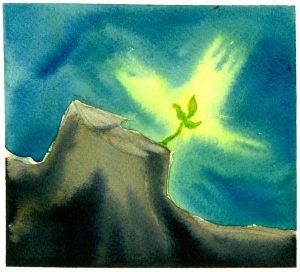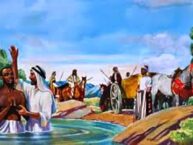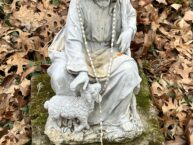 November 24, 2019: May God’s words alone be spoken, may God’s words alone be heard. Amen.
November 24, 2019: May God’s words alone be spoken, may God’s words alone be heard. Amen.
As I thought about the upcoming Thanksgiving holiday, one in which most of this nation will travel far and wide to share a meal with family, the readings from today kept coming to mind. For I think there are a number of folk, particularly in families who put the fun in dysfunctional, who probably whisper something similar to what we heard in our texts this morning. As they gulp another glass of wine, I can imagine them praying like the Psalmist “God is my refuge and strength, a very present help in trouble…” Or, as we heard in the epistle, some might pray “may I be prepared to endure everything with patience…”
Ahhh, the joy of holiday gatherings. I remember hearing about one Thanksgiving, when at dinner one wife said, “Who wants to carve the turkey?” Her father said, “You carve him, you married him.” Hopefully for most of you, this does not seem familiar.
Today is the third Sunday of Advent, and in some churches, it is the Reign of Christ or Christ the King Sunday, a tradition that began in 1925. Yet the issue with this assertion, and why it can be problematic for some, is that it is not something Jesus would ever claim – this kingly title. That is antithetical to his focus, at least the way in which kingship is generally thought of in our earthly sphere. But if we listen to the passages from our texts today, we can see that there is a common thread that redefines kingship, and it is that type of authority in the world that God hopes for us, that Jesus offered to us, and that should be celebrated today.
Before we get to the Hebrew text from Jeremiah, it is helpful to consider that there are certain words that when spoken by a parent to a child signal trouble. First would be the use of our full name, right? When mom or dad calls you using your middle name or names, you know you are in deep. Or for that matter, my dog knows she is in trouble when I yell out “Trinity Alexis Wilcox! Get in here right now.” Yup – somebody is in the dog house – which is somewhat ridiculous given that the entire house is her realm. #spoileddog. The second way we know we are in trouble would be when a parent says something like “You did (or did not) do x, so now I will now do this to you.” #groundedforlife.
Well, that is what we hear in the text in Jeremiah. First, it is helpful to remember that shepherds in the Hebrew texts were always a reference to kings. So today we hear that God says to these rulers, “…concerning the shepherds who shepherd my people: It is you who have scattered my flock, and have driven them away, you have not attended them, so I will attend to you…” This is not what you want to hear from your parents, and most especially not from God. “you have not attended them, so I will attend to you…” The “them” in this case are the sheep of the shepherd, or the people of the kingdom. God’s people.
Now, I know it is hard for us today to imagine a leader who is corrupt, abuses their power, neglects their people, is unjust toward those in need, or seeks glory while ignoring the pain of those whom they are called to serve. Oh so hard to do, right? But try to imagine it if you can, because the text in Jeremiah was speaking about just this type of earthly power, and God was not only rebuking those leaders for their self-serving reigns, but proclaims that their days are numbered – that new shepherds will be raised up from a righteous branch who will be just, wise, and care for the people.
And while in Advent, we in the Christian tradition have taken this “…raise up for David a righteous branch…” out of its Jewish context to refer to God becoming incarnate in Jesus, we do see in Christ the very essence of kingship in the dream of God. We see it most especially in the Gospel passage we heard this morning too.
Now, is it one when he is preaching on a mountain? No. Is riding triumphantly into Jerusalem? No. Nor is he reading the Torah in the temple. He is instead hanging on a cross, suffering.
In his death on the cross, Jesus offers us all an example of the “fullness of God…reconciled to all things” as the author of Colossians tells us. Yet the author it is not only talking about his death, but his life, where Jesus lived as the good shepherd, the example of what authority and power should do in the world, even laying down his life for his flock. He heard the cries of the oppressed and went to them. He saw the sick and those in pain and healed them. And even in his final moments on the cross, he gave comfort to the one suffering beside him. This man could do nothing for him, could offer him no relief from his own pain – yet Jesus not only heard him, he gave him comfort in his darkest hour.
You know, at some protest marches in the past few years, you can hear people shouting “This is what democracy looks like!” Well folks, THIS is what kingship looks like for the people of God. Think about that.
Think about this too: Every week we say the Lord’s prayer, right? Most of us know it by heart. But do we ever consider what it really means? When we say “…thy kingdom come, they will be done, on earth as it is in heaven…” do we know what we are asking? Because if we really think about what God’s kingdom looks like, what Jesus told us and showed us about it, what the God of Jeremiah is saying, then we are asking for a wholesale overturning of our understanding of what power is, and what our role is on earth. This is no passive prayer folks – it is revolutionary!
No wonder the author in Colossians prays that we may “be made strong…and be prepared to endure everything with patience,” because this is not a life that will be easy. And folks, if we are to live it, we are going to need that “daily bread” of word and Word made flesh to live into what God is calling us – the shepherds today, the servants (suffering or otherwise) to do. We need this Eucharistic feast to fill our hearts, which is to say that we need this feast of Thanksgiving – the very meaning of the word Eucharist – we are going to need it to be the body of Christ we are called to be – to live as the shepherds of God’s people in the world.
Some may find it odd that it is a feast of Thanksgiving that nourishes us. But, if we really think about what being thankful really means, we find it can be transformative.
While on sabbatical in Oxford, I heard this story:
“John Wesley was about 21 years of age when he went to Oxford University. He was gifted with a keen mind and good looks, yet, in those days he was a bit snobbish and sarcastic (or so I was told). One night, something happened that set in motion a change in Wesley’s heart. While speaking with a porter, he discovered that the poor fellow had only one coat and lived in such impoverished conditions that he didn’t even have a bed. Yet, he was an unusually happy person, filled with gratitude to God. Wesley, being immature, thoughtlessly joked about the man’s misfortunes. “And what else do you thank God for?” he said with a touch of sarcasm. The porter smiled, and in the spirit of meekness replied with joy, “I thank Him that He has given me a life and being, a heart to love Him, and above all a constant desire to serve Him!” Deeply moved, Wesley recognized that this man knew the meaning of true thankfulness.” This porter’s life lived in gratitude gave him strength in difficult days, and had a transformative effect on those whom he encountered – he became the shepherd Wesley, a lost sheep, needed.
To be sure, there are times in our lives when giving thanks is difficult at best, and to push people into a feeling of gratitude in these dark times is to not understand the ways in which darkness can seem to chain a person’s heart beyond their ability to break free. Yet when we can free ourselves from linking gratitude to particular circumstances, then we become free in our souls to embrace thanksgiving to God for our very breath, for a new day to live the life God hopes for us.
A life of thanksgiving is a life of freedom to live. Gratitude isn’t about what we have, but about who we are – and in it, we are freed from the bonds of ego and desire for more that leads some toward an unrighteous path of selfishness, greed, and lust for power. One who is thankful in all things will not be able to stand on the backs of others to gain more, or really, to have want for it. In other words, those that are good shepherds are grateful for the staff in their hand, even while knowing the burden of the responsibility, and while living this sometimes difficult earthly life, for they know who placed that it there, and how important their role is to those they are called to serve.
To be clear, this call of the shepherd is not for a select few, but all of us. The author of Colossians reminds us, “For in him all the fullness of God was pleased to dwell, and through him God was pleased to reconcile to himself all things.” And the thing is, we are the body of Christ now – and God is pleased to dwell in our hearts, reconciling us to God and all of creation, if we are willing to let Her in. If we are willing to be the righteous shepherds of God for a world in need.
We are called to be shepherds, to care for God’s people as Jesus the greatest shepherd did. This authority is given to us in baptism, and we live it out in the world through humility and love, serving those Jesus would see, standing by those Jesus would lift up, and shining His light in the dark places of oppression, violence, and hatred that all may feel God’s grace, and justice spread far and wide.
And to do this, to live out our baptismal call, to be the shepherds we are to be, the fullness of Christ in the world, we begin in gratitude with a feast of Thanksgiving. We are restored in the Eucharist, in His body and blood, to be the shepherds for the sheep of God’s creation.
Today we also bring forward a symbol of our gratitude – our pledges of time and treasure – as an offering to the God who loved us enough to be one with us, even knowing the cost. It is one of the ways we commit ourselves in common purpose to our role in God’s kingdom, an act rooted in thanksgiving to God for all that is, and all that may be. And through these generous acts of faith, we will serve the people of God in ways small and large in our parish, in our neighborhoods, and in the world.
And after leaving here, we will celebrate another meal of thanksgiving with those we love on Thursday. When we do, may we be mindful, as shepherds would, of those whom Jesus served – the last, the least, the lonely, and the lost – for whom a meal such as we are likely having would seem only a dream. Let us remember them, and commit to bringing about justice and righteousness in our time, where all are fed, all are welcome, and all know the healing of God’s grace and love – for surely then thy kingdom will have come, and thy will have been done.
Happy Thanksgiving everyone!
Amen.
For the audio from the 10:30am service, click below, or subscribe to our iTunes Sermon Podcast by clicking here:
The Rev. Diana L. Wilcox
Christ Church in Bloomfield & Glen Ridge
November 24, 2019
Advent 3 – Year C – Track 2
1st Reading – Jeremiah 23:1-6
Psalm 46
2nd Reading – Colossians 1:11-20
Gospel – Luke 23:33-43






